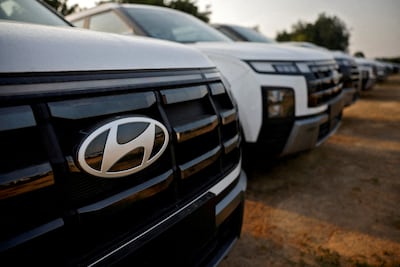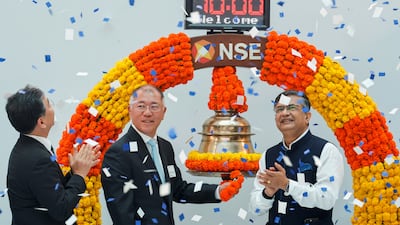Hyundai Motor India shares slipped almost 6 per cent early in their Mumbai debut, a tepid start to trading for what was the nation’s largest-ever initial public offering.
The shares traded as low as 1,844.65 Indian rupees ($21.94) after they were priced at 1,960 rupees, the top of the marketed range. South Korea’s Hyundai Motor sold a 17.5 per cent stake in its local unit in the IPO, seeking to benefit from the investor frenzy for share sales in India, one of the world’s most vibrant venues for listings this year.
Hyundai Motor India, the nation’s second-largest carmaker by sales, was valued at about $19 billion in the IPO. Some saw the shares as pricey, with Bloomberg Intelligence analyst Joanna Chen noting that the valuation was about five times its Korean parent’s, though it was in line with those of Indian peers such as Maruti Suzuki India.
While the offering was eventually oversubscribed more than two times, book-building was slower than some had anticipated. Hyundai’s deal saw strong demand from institutions, which flooded in on the last day of sale. Retail investors, however, only bought about half the portion that had been reserved for them in the IPO.
Individual traders were turned off by the parent company getting all of the IPO proceeds as well as cooling demand in India’s car industry, analysts have said. The poor retail interest stands in contrast to the frenzy seen in some recent IPOs, particularly among smaller issues.

Hyundai’s initial decline makes it an outlier given that enthusiasm for Indian share sales has generally carried over to their post-listing performance. New listings in the nation have risen by an average of 39 per cent on their first trading day this year, according to data compiled by Bloomberg. Among IPOs of over $500 million, the average gain was 66 per cent.
Some analysts are positive on the stock’s long-term prospects.
“Hyundai Motor India’s IPO offers potential long-term value, but it is not suited for investors seeking quick gains,” said Devi Subhakesan, an analyst at Investory, ahead of the debut. “Valuation risks are expected” amid shifting consumer preferences and rising competition in India’s car industry.
India’s emergence as the world’s fastest-growing major economy, as well as its expanding middle class, presents an opportunity for carmakers. The nation’s car market is on track to reach 20 million units by 2047, Suzuki Motor executive vice president Kenichi Ayukawa said in July. A total of 4.2 million passenger vehicles were sold in India in the fiscal year ended in March, according to the Society of Indian Automobile Manufacturers.
Nomura Holdings initiated coverage with a buy rating ahead of the listing, citing expectations for “healthy” volume growth and vehicle price increases. It set a price target of 2,472 rupees, implying a potential upside of about 26 per cent over the IPO price.
With Hyundai’s proceeds, Indian IPOs have raised more than $12 billion so far this year, eclipsing volumes for the past two years but still below the record $17.8 billion raised in 2021, according to data compiled by Bloomberg. Other pending debuts include food-delivery company Swiggy and the renewable-energy arm of state-run power producer NTPC.
About 20 companies from Asia Pacific are listing shares this week in deals that may raise more than $8 billion, the biggest weekly volume since April 2022, according to data compiled by Bloomberg. Shares of Japan’s Tokyo Metro are scheduled to start trading on Wednesday after a $2.3 billion offering.

